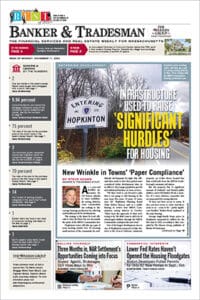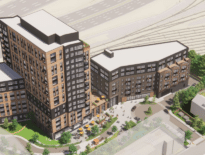Boston officials want to take a big burden off of multifamily developers required to add affordable housing to their projects, and make it a lot easier for residents to find reasonably-priced housing at the same time.
In a speech to the Greater Boston Chamber of Commerce Wednesday morning, Mayor Michelle Wu announce the city would be taking over marketing developers’ affordable housing units, streamlining the forms developers must submit, eliminating a step in the affordable housing resident application process and post housing lottery results online to help prospective tenants understand where they sit in line.
“When a unit has been built and is ready to be filled, we will have a renter or buyer ready to move in on day one,” she promised.
Currently, each developer has to market their building’s affordable units separately, with requirements including a 68-page “marketing and tenant selection plan” – which Wu pledged would be slashed to five pages – and 16 hours of leafleting on street corners near the development site.
Wu’s move comes as she prepares to bring an ordinance before the City Council that would dramatically increase affordable housing requirements on commercial development, including setting aside 3 percent of any large building’s units for tenants with state or federal Section 8 housing vouchers.
Scholars and housing workers alike have extensively documented the effects this and similar systems in other Massachusetts communities have created: a “broken” system where subsidized housing units sit vacant for months, even as the rest of the building fills up, and both nonprofit and for-profit developers are saddled with significant expenses and lost income at a time when construction costs and the prices of development loans are putting a major crimp on the region’s housing pipeline.
“Every development that’s processing applications is probably spending over $100,000 to do that,” Leslie Reid, the executive director at the nonprofit Madison Park Development Corp. said at a panel discussion hosted by the Boston Foundation last fall to mark the release of its annual Greater Boston Housing Report Card.
Advocates have tried to fill the gap at the state level with a nonprofit listings site called Housing Navigator, but during the same event Reid spoke at, Housing Navigator Executive Director Jennifer Gilbert made it clear the website requires an unsustainable amount of work without help from government or another deep-pocketed entity.
Wu, in her Wednesday speech, said the city will start hosting information sessions across its neighborhoods and take on the responsibility of advertising developers’ affordable units, which a Thursday email announcement from the Mayor’s Office of Housing described as “coordinated advertising for all active projects in both print newspapers and digital mediums” and promised more changes “over the next several months” to improve the experience for both housing seekers and developers.
The head of one of the state’s biggest real estate trade groups gave Wu’s proposal a positive review.
“NAIOP’s members have been concerned about affordable units sitting empty for years, and we are grateful for the Mayor’s focus on addressing this issue to ensure our most vulnerable residents have access to available housing,” NAIOP-MA CEO Tamara Small said in an email to Banker & Tradesman.







